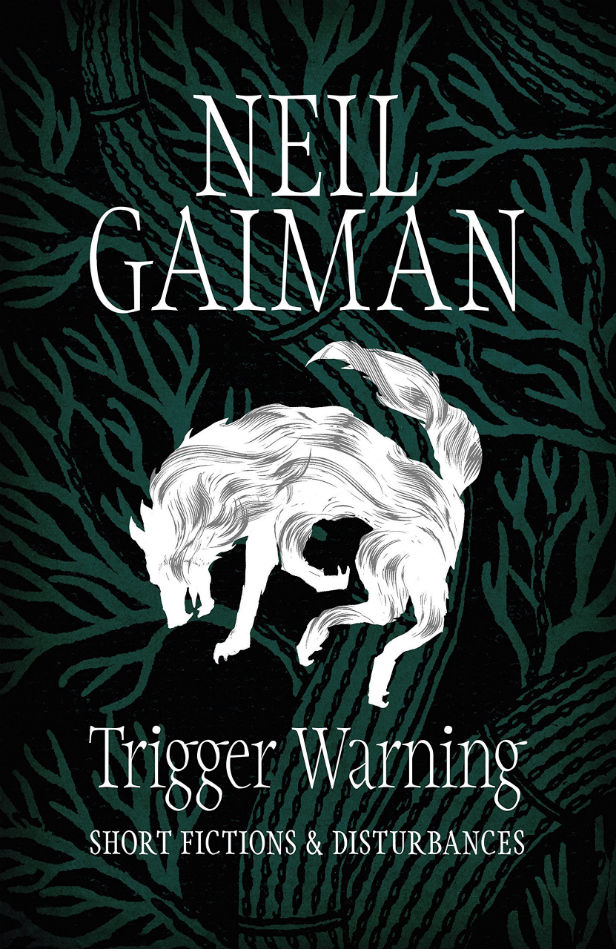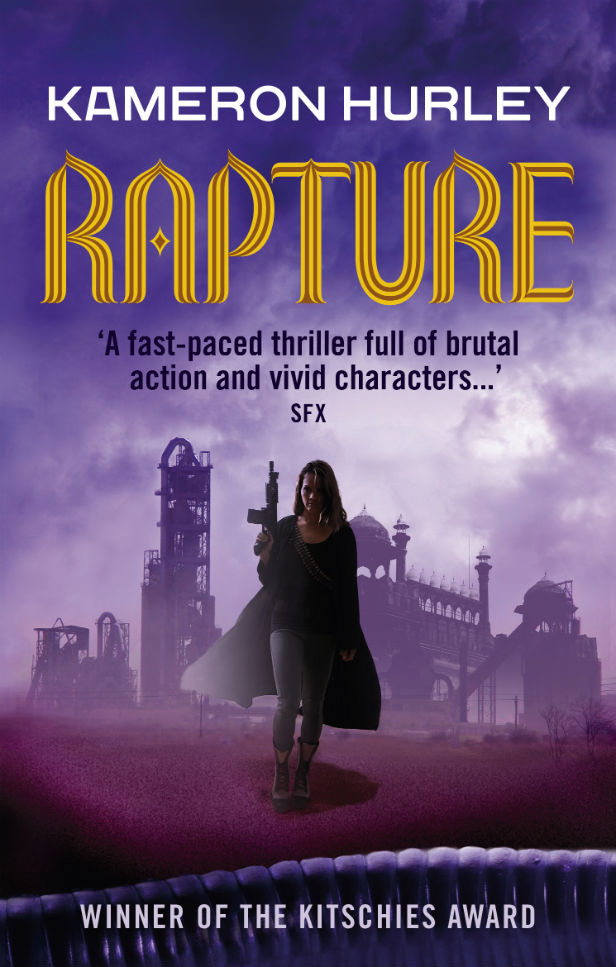 When Gaiman Pulls the Trigger:
When Gaiman Pulls the Trigger:
The Trouble with Being a Writer the World Listens To
Little triggers, Neil Gaiman tells us in the introduction to his new collection, Trigger Warning, are things that “upset us.” Which makes it sound like there should be trigger warnings for bee stings, I suppose, or signs up about how you may be upset if you don’t get the last cupcake at the party. If you type “Trigger Warning” into Google right now, his collection, with that definition of triggers, is the first thing to pop up.
Conflating “little triggers” with “Trigger Warnings” is, to put it mildly, irresponsible. I grew up in my online life in feminist science fiction circles. I encountered trigger warnings all the time, primarily on feminist academic blogs. These were one-sentence heads’ ups at the top of a post about sexual assault or cutting or abuse. They were courtesy notes for folks who were survivors of same, so that they could take a few minutes to decide if they were in the right frame of mind to read that material. Trigger warnings were designed to prevent people who have post-traumatic stress flashbacks from reading material that would trigger that stress. War veterans, sexual abuse survivors; some of the most vulnerable people in our society, find themselves navigating a very horrifying and triggering world every day, which is why so many commit suicide. So it was a small kindness, in these spaces, to put a little note up front so they could, in their down time, in their safe spaces, avoid that stuff if they were having a particularly horrifying day. In feminist academic spaces in particular, the chances that one of the women reading your work had been sexually abused or assaulted in some way was about 1 in 4. Reading triggering content could lead to self-harm, depression, and even suicide. It was an easy, decent thing to do. I have one here at the beginning of a review I wrote of a film that’s about the abuse and torture of a woman.
The actual definition of what a “Trigger Warning” is hasn’t changed, but a couple of high-profile rants online about college professors having discussions about whether or not to flag possibly traumatic content in their course material created quite a kerfluffle online a year or so back, probably about the time Gaiman was coming up with the title to his collection. People generally flipped out about the entire idea behind this, without having ever seen what these “content warnings” looked like, and forgetting that we see “content warnings” every single day on television (Anthony Bourdain’s mild-mannered No Reservations food and travel show had a content warning. WHERE’S THE OUTRAGE?).
Earlier this year, The Washington Post spoke with Angus Johnston, who teaches at the City University of New York’s Hostos Community College. Here’s what his PC-police “content warning” actually said:
At times this semester we will be discussing historical events that may be disturbing, even traumatizing, to some students. If you are aware of particular course material that may be traumatizing to you, I’d be happy to discuss any concerns you may have with it before it comes up in class. Likewise, if you ever wish to discuss your personal reactions to such material with the class or with me afterwards, I welcome such discussion as an appropriate part of our coursework.
I’m not even sure I’d call this a “trigger” warning. It’s a pretty general heads’ up. But irresponsible uses of the term in order to get clicks aren’t helping to clarify the waters. Gaiman talks in the book’s introduction about how he felt the term “Trigger Warning” was creeping out of its intended use and into college materials, and how it could one day be applied to his own work, and he figured he would get out ahead of the trend and put it on his work before anyone else could.
Wry, subversive, biting commentary, right?
The problem with mainstreaming this kind of use of the term is that instead of saying, “Yes, trigger warnings are useful so let’s not continue to water it down” what you do when you title a rather typical short story collection “Trigger Warning” is that your work becomes part of the problem of breaking it down into meaninglessness and slapping it on any old thing as a marketing gimmick. You co-opt a term used in feminist spaces, and you use it for shock value, to be edgy and subversive, instead of acting like an ally who has empathy and understanding of the term for its intended use.
Gaiman, in his introduction, goes immediately from saying “Yes, I understand its intended use” to “I decided to use it in this work in a way in which it’s not intended.” A little whiplash, there.
As an author, one of the first things I learned was that I needed to take responsibility for the images I put onto the page. For the words that I used. For the themes I dealt with. I’ve fallen down a lot. I make mistakes. And this only becomes more important the broader and wider my audience and influence becomes. When you get to be Gaiman-level famous, you have the power to shift an entire conversation.

What calling a short story collection “Trigger Warning” did has simply served to lend a heavyweight writer’s credibility to a subset of people who believe we should all just suck up our problems and kill ourselves if we can’t butch up and live in the brutal world we’ve made. I saw some readers outright mock the entire idea of trigger warnings in tweets in which they proudly displayed copies of the books, as if purchasing Gaiman’s latest story collection was, in itself, some kind of subversive act, reading something people told them not to read. Down with the man!
What they weren’t getting, what they would now never get, is that trigger warnings weren’t for them. And this book had nothing at all to do with trigger warnings. But it didn’t matter. This is what a trigger warning would mean to them, now: something to mock. The PC-police trying to tell them what to do. It was a meaningless thing, now, for whiners and the weak-minded.
The one time I tried to discuss how uncomfortable I was with this story collection title and its co-option of the term, I had a bunch of people unfollow me on Twitter and some Gaiman fans come after me, one of whom tagged Gaiman on Twitter and told me I should say such a thing to his face (I’m not sure why – perhaps he hoped for fisticuffs. There were none. Writers can politely disagree, as I am doing here). Several writers I knew who were uncomfortable with the title and co-option of the term said they didn’t want to say anything, because no one wants to ruin their chances of a Gaiman retweet.
And I thought: What kind of a world do we live in where other professionals, other creators, fear the social power of another creator to such an extent that they can’t even have professional disagreements? And if other creators won’t say anything, what about the people in our society that these sorts of warnings were designed to protect? Why would any of them say, “Hey, that’s not cool?” and risk the pile-on?
There’s a better world that we can make together. One that doesn’t involve grinding down the tenuously built support structures that came before. One that’s about building up instead of smashing apart. But we can’t do that if we’re afraid to say “boo” to the damaging actions taken by some of the most powerful people in our communities. Even and especially allies.
Authors choose the words they use. They choose them deliberately. Consciously. It’s our job.
I suppose there’s an upside to all of this, of course. One good thing came of calling this collection Trigger Warning.
It immediately signaled that this was not a book for me.
Kameron Hurley is the author of the novels God’s War, Infidel, and Rapture a science-fantasy noir series which earned her the Sydney J. Bounds Award for Best Newcomer and the Kitschy Award for Best Debut Novel. She has won the Hugo Award (twice), and been a finalist for the Nebula Award, the Clarke Award, the Locus Award, and the BSFA Award for Best Novel. Her most recent novel is the subversive epic fantasy The Mirror Empire. The sequel, Empire Ascendant, will be out in October 2015. She writes regularly for Locus Magazine and publishes personal essays at kameronhurley.com.
Rapture by Kameron Hurley is available on 26 February and you can pre-order it for £7.19 at Amazon.co.uk. Keep up with the latest sci-fi news with the new issue of SciFiNow.

